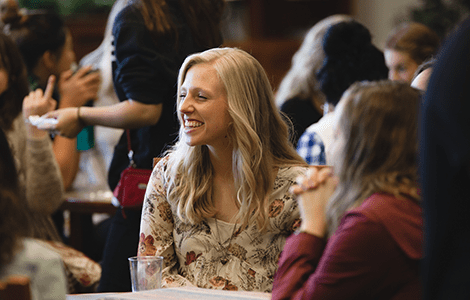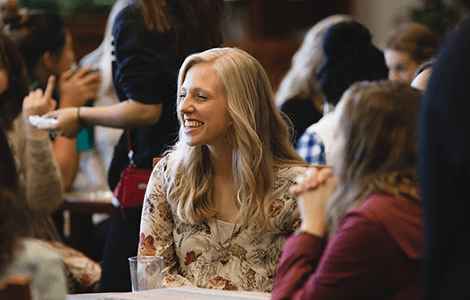Research project helps students examine the immigrant, refugee experience

Research project helps students examine the immigrant, refugee experience

Lindsey Seller sat across an Egyptian schoolmate, a friend she’s known for three years. For the first time, she listened to his story as a refugee.
Seller, senior social justice major, is one of five students chosen to participate in the Faculty-Led Research Experience (FLARE) project that intends to identify the best ways to assist new immigrants and refugees in their transition. Seller and the team of students listened and documented their stories individually.
“What really stood out to me was that I have people directly around me that have these deeper experiences to share and pretty much all you have to do is ask and they’re willing to share their stories with you, but I’ve never made time to do that,” Seller said.
The project, known as “Welcoming the Stranger,” is a joint initiative between the University and The Salvation Army that came after World Relief, an organization that helps refugees resettle, closed its Nashville office—giving the responsibility to their local church partners.
“When World Relief had to close their offices in 2017 in Nashville that sparked the question, ‘who is connecting refugees to local churches?'” said Jamie Casler, director of Trevecca’s J.V. Morsch Cent for Social Justice. “Not only how they’re getting connected but also is the church being equipped to receive immigrants and refugees now that World Relief is no longer in Nashville?”
The American Immigration Council in 2015 states that foreign-born individuals take up five percent of the Tennessee resident population.
Each student used the oral history method to determine the most pressing needs and the barriers that keep five individuals, either immigrants or refugees, away from success. Students then transcribed their interviews and identified common themes to be shared with local churches, presented at the research symposium and used for future studies.
The five students involved in the project are from Trevecca’s social justice, journalism and intercultural studies programs with prior training with immigrants and refugees. But understanding what they value became new with this experience, Casler said.
“Americans think that if you can get an immigrant or refugee an English language training, a job and a house, that’s the common American perception of a successful transition,” he said. “A successful transition for [immigrants and refugees] looked like being with their own community of their own kind.”
Seller and Casler agree that interviewees see family as a significant part of a successful transition as supposed to America’s individualistic culture—a factor, Casler said, that isn’t available to many immigrants and refugees.
The Trevecca team planned on interviewing immigrants and refugees living in Nashville for three years but later expanded the limit to eight years because of the challenge of finding individuals willing to share traumatic experiences.
“I expected people who had been here for a [shorter] time would be more emotional about [their story] because it was fresher. But it seems like the events that had shaped their lives was just as powerful as they had been when they first got here,” said Rebekah Warren, a recent social justice graduate who participated in the project during her senior year.
The participants entered the project with theories and ideas from classes and pre-research which, according to Seller, makes it easy to be “myopic… in the way that we study.”
“In this experience, we weren’t hearing from professors, what they thought. We were sitting across a table from people who’ve lived this experience,” said Seller. “It kind of eliminated a middleman and we just got straight to the source.”
By Maria Monteros
Media contact: Mandy Crow, mmcrow@trevecca.edu, 615-248-1695
